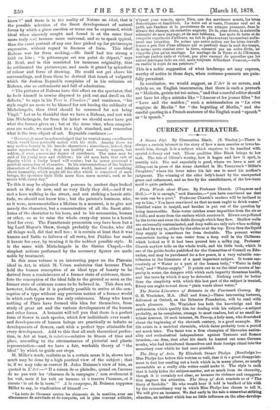Plain Words about Water. By Professor Church. (Chapman and Hall.)—"
It is enough," said Rasselas,—" you have convinced me that no man can be a poet." Professor Church's readers will be inclined to say to him, Yon have convinced us that no man ought to drink water.' Distilled water is insipid, and besides is put out of the question by being inaccessible. Rain-water catches some impurities from the air as it falls, and more from the surface which receives it. Rivers are polluted by the towns and even the fields through which they flow. Shallow wells are universally contaminated, and deep wells are only safe when nothing can find its way in, either by the sides or at the top. Even then the liquid they supply is sometimes far from desirable. The present writer remembers having to 'use water from a deep well in the Chilterns. which looked as if it had been poured into a milky jug. Professor Church anyhow tells us the whole truth, and his little book, which is one of the guide-books published for the Committee of Council on Edu- cation, and may be purchased for a few pence, is a very valuable con- tribution to the literature of a most important subject. It treats suc- cessively of "Water as a part of the human body," "Water in daily food," and "Water-supply." It points out to us the chief causes of im- purity in water, the dangers with which such impurity threatens health, and the tests by which it may be detected. Nothing could be better than the simplicity with which this last part of the subject is treated. Every one ought to read these "plain words about water."


































 Previous page
Previous page